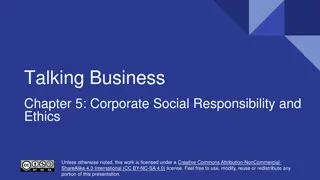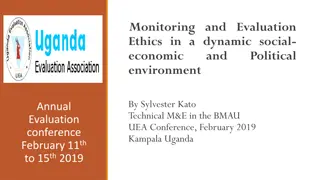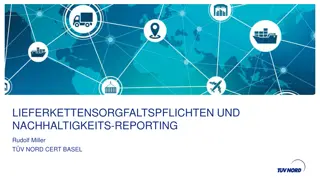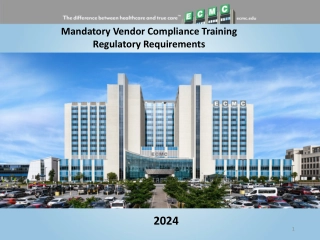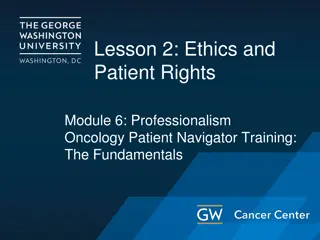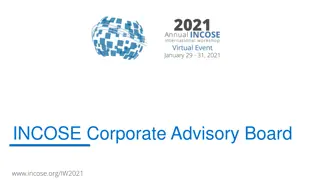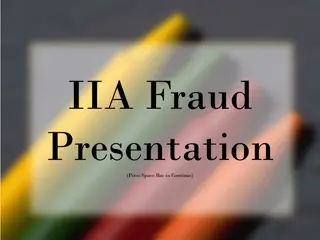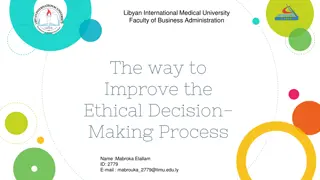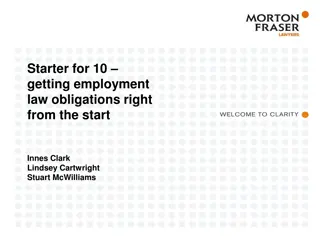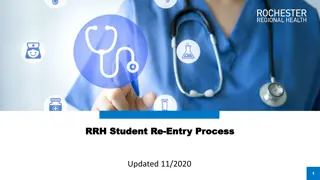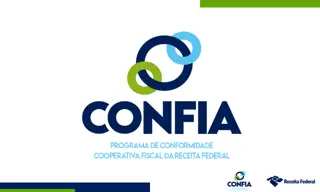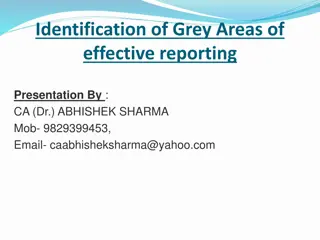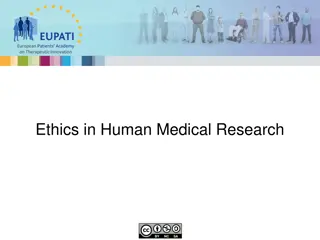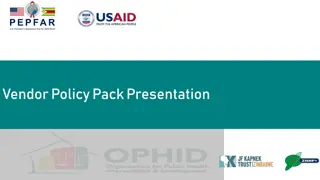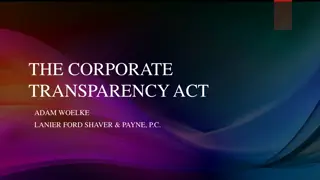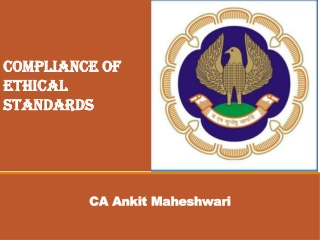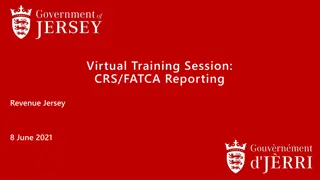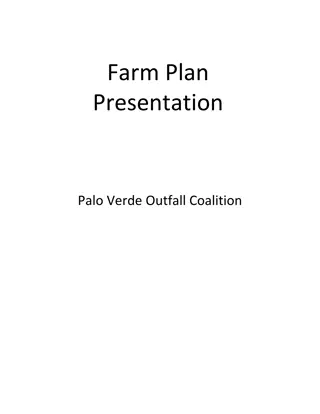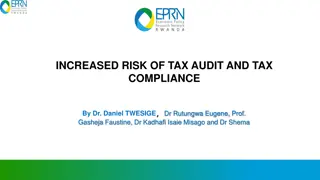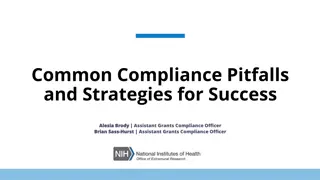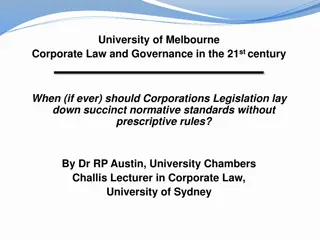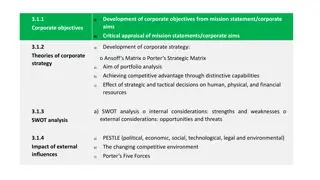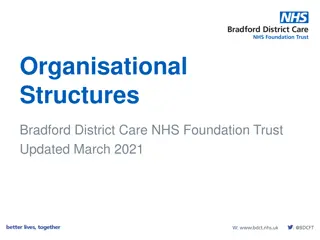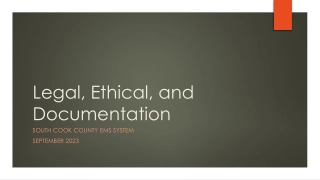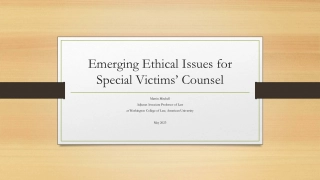Corporate Compliance Program: Ensuring Ethical Practices
Corporate Compliance program at King's Daughters focuses on ensuring adherence to laws, healthcare program requirements, Code of Conduct, and internal policies. It demonstrates commitment to ethics, integrity, and quality care. The program outlines guidelines for team members' behavior, corrective actions for misconduct, and reporting mechanisms for regulatory compliance. It also protects patient information and financial viability by enforcing seven key elements of the OIG Model Compliance Program.
Download Presentation

Please find below an Image/Link to download the presentation.
The content on the website is provided AS IS for your information and personal use only. It may not be sold, licensed, or shared on other websites without obtaining consent from the author. Download presentation by click this link. If you encounter any issues during the download, it is possible that the publisher has removed the file from their server.
E N D
Presentation Transcript
Corporate Compliance Corporate Compliance Heather Marcum
Corporate Compliance and Integrity Team Corporate Compliance and Integrity Team Heather Marcum Tonia Hall Executive Director/ Compliance & Privacy Officer x80161 Compliance & Privacy Manager x84451
What is a Corporate Compliance program? What is a Corporate Compliance program? Corporate Compliance refers to King's Daughter's program to ensure King's Daughters complies with: Federal, state and local laws Federal healthcare program requirements The Code of Conduct King's Daughters policies and procedures
Our Corporate Compliance Program Our Corporate Compliance Program Demonstrates to the community King's Daughters commitment to corporate citizenship Reinforces King's Daughters culture of ethics, integrity accuracy to all team members and provides guidelines for leadership compliance responsibilities Provides an expectation of team member, provider and contractor behavior Provides procedures to correct misconduct Provides effective communications for Board of Directors through an organized framework for regulatory compliance tracking and reporting Protects the financial viability of King's Daughters Mitigates sanctions which may be imposed by the government Ensures King's Daughters provides the highest level of quality care Protects the Protected Health Information (PHI) of the patients
Seven Elements of the OIG Model Compliance Seven Elements of the OIG Model Compliance Program Program Screening Employees, Contractors, Physicians, Board Members Compliance Officer and Compliance Oversight Corrective Actions to Identified Problems Policies and Procedures Auditing and Monitoring Enforcement of Violations Education
Compliance & Integrity Committee Compliance & Integrity Committee It is important you know representatives of the below departments are members of the Compliance & Integrity Committee. They are available to you as a compliance resource. Legal Human Resources Internal Audit Environmental / facility operations Social Work Revenue Cycle Kingsbrook Kings Daughters Ohio Medical Practice Services Radiology Services Laboratory Services Administration Quality Home Health Behavior IST Security Transition of Care Services
Code of Conduct Code of Conduct King's Daughters Code of Conduct provides the principle guidelines to conduct daily business activities ethically and legally. The Code of Conduct is the Constitution of King's Daughters Compliance & Integrity program and is designed to assure King's Daughters meet compliance goals. Each of us has a role to play and can make a real difference. We have individual responsibility and accountability to follow King's Daughters policies and procedures, Code of Conduct, Federal health care program requirements, and to conduct activities in an ethical manner. The Compliance Handbook contains King's Daughters Code of Conduct. Review the Code of Conduct and ask questions if you do not understand what is expected of you.
Code of Conduct Code of Conduct The Code of Conduct must be observed by everyone: Team Members Leadership Team Board of Directors Medical Staff and Allied Health Professionals Vendors and Contractors Students Volunteers
Conflicts of Interest Conflicts of Interest A Conflict of Interest arises in the workplace when a team member has competing interests or loyalties that either are, or potentially can be, at odds with each other. King's Daughters expects its Team Members, Medical Staff Members, Volunteers and Contractors and Vendors to exercise attention, good judgment and prudence in their relationships, obligations and financial interests so that they do not conflict with the interests of King's Daughters or the performance of their duties. Review King's Daughters policy and procedure on Conflicts of Interest. Team Member s are obligated to report potential conflicts of interest: upon hire / on boarding process (conducted by HR) Anytime a conflict develops During annual general compliance training Examples of potential conflicts: Provide consulting services to competitor Directly supervising a close family member or in a position to make decisions to benefit the family member
Fraud, Waste, & Abuse Fraud, Waste, & Abuse Healthcare is a government enforcement priority because of the potential for fraud, waste and abuse. Fraud is making material false statements or representations of facts that an individual knows to be false or does not believe to be true in order to obtain payment or other benefit to which we would otherwise not be entitled Abuse are practices that directly or indirectly result in unnecessary costs or improper payments for services which fail to meet recognized professional standards of care Waste is overutilization of services or other practices that, directly or indirectly, result in unnecessary costs to the health care system, including the Medicare and Medicaid programs. The Federal False Claims Act governs violations of Federal health care program requirements.
Fraud, Waste, & Abuse Fraud, Waste, & Abuse King s Daughters is committed to preventing, detecting, and correcting fraud, waste, and abuse within our operations. All team members have an obligation to report possible compliance violations to the Compliance & Integrity Department. Team members also have the ability to report possible violations of the False Claims Act (FCA) directly to the Federal Department of Justice as a qui tam (also known as whistleblower) relator.
Federal False Claims Act Federal False Claims Act The False Claims Act provides for civil liability for individuals and organizations that knowingly submit, or cause the submission of, false claims to the Federal Government. Examples include, but are not limited to, claims for services that: Have not been provided Are not supported by documentation in the patient s medical record Are paid or being paid by another claim Are incorrectly coded
Overpayments Overpayments The Affordable Care Act requires that a person (e.g., provider, hospital, medical office) who received a Medicare or Medicaid Overpayment to report and return the Overpayment. What is an Overpayment? A Medicare or Medicaid overpayment is any funds that a person receives or retains to which the person, after applicable reconciliation, is not entitled. Examples of Overpayments include, but are not limited to, the following: Billing the wrong level of care for an office visit; Separately billing services which should have been bundled into one bill; Billing for an MRI when a CT was performed; Billing for a service which was not properly documented; or Billing for a service which was not medically necessary.
Overpayments Overpayments It doesn t matter if an Overpayment is a mistake or not intentional. If Medicare or Medicaid paid an excess amount, an Overpayment occurred. An overpayment must be reported and returned no later than sixty (60) days after the date on which the Overpayment was identified. Failure to report an Overpayment may result in liability under the False Claims Act. If you suspect an Overpayment has occurred, immediately contract your supervisor or the Compliance and Integrity Department.
Overpayments Overpayments To reduce the chance that an overpayment could be made, King s Daughters takes these actions: Billing functions for professional, hospital, and home care services are regularly monitored by applicable departments. Monitoring National and Local Coverage Determinations identify Medicare s payment and coverage criteria for certain tests and procedures. Many of these National and Local Coverage Determinations are built in EPIC and generate prompts when entering a test or procedure. National and Local Coverage Determinations Audits are performed by Internal Audit, Compliance & Integrity, and external contractors. Audits Team members are required to report any suspected concern with billing activities which may result in overpayment. Reports can be made using any of the available reporting methods. Reporting
How do I report suspected compliance How do I report suspected compliance violations? violations? All King's Daughters team members, providers, and contractors/vendors are required to report concerns about actual, potential or perceived misconduct to the Compliance & Integrity Department. One may use any of the following reporting tools: Call the Compliance Hotline at (606) 408-4145 or (877) 327-4145 Call the Lighthouse Services Hotline at (844) 940-0003 which is an independent third-party hotline provider contracted by King's Daughters as an additional anonymous reporting tool Complete the Compliance Concern Form found on the intranet Contact Executive Director/ Compliance & Privacy Officer, Heather Marcum (606-408-0161) Contact Compliance & Privacy Manager, Tonia Hall (606-408-4451) Contact your supervisor, director or Vice President Email corporatecompliance@kdmc.kdhs.us (not anonymous) Send written correspondence intercompany to 2201 Lexington Avenue, Ashland, KY 41101 Attn: Compliance & Integrity Department
What kinds of things should I report? What kinds of things should I report? Violations of the law (Federal, state or local) Violations of the Federal healthcare program requirements Inappropriate gifts, entertainment or gratuities Discrimination Workplace or sexual harassment Hostile work environment, bullying Stealing/misused of King's Daughters assets Billing or coding concerns Documentation issues Violations of patient confidentiality (can be reported to Heather Marcum or Tonia Hall) Violations of the Code of Conduct Violations of policies and procedures Potential conflicts of interest
How does KD prevent violations of How does KD prevent violations of the False Claim Act? the False Claim Act? King s Daughters established a comprehensive compliance program through the establishment of the Compliance & Integrity Department. Here are some examples of compliance program activities Internal Audit s auditing efforts Compliance & Integrity Department s monitoring and auditing compliance plan Contracting with external resources to provide reviews Revenue Cycle s data mining and monitoring Leaders self-monitoring their department risks; Annual Compliance Risk Assessment Review of the Office of Inspector (OIG) Work Plan which identifies risks Follow up on concerns reported to the Compliance & Integrity Department
Inducements Inducements The OIG has interpreted the prohibition on inducements to permit Medicare or Medicaid providers to offer beneficiaries inexpensive gifts (other than cash or cash equivalents) or services without violating the statute. For enforcement purposes, inexpensive gifts or services are those that have a retail value of no more than $15 individually, and no more than $75 in the aggregate annually per patient.
Guidelines for Gifts and Gratuities Guidelines for Gifts and Gratuities Team members and contracted employees are prohibited from soliciting tips, personal gratuities or gifts from patients or vendors Team members may accept unsolicited business courtesies from vendors, excluding cash, up to a value of $50.00 Any business courtesy from a vendor in excess of $50.00 in value must be approved by Compliance and Integrity Department in advance of team member acceptance Team members and contracted providers may accept an unsolicited gift from a patient or a patient s family member of nominal value (i.e, having a value of less than $100.00)
Disruptive Behavior, Workplace Disruptive Behavior, Workplace Harassment and Sexual Harassment and Sexual Harassment Harassment
Kings Daughters strives to maintain a workplace that fosters mutual team members respect and promotes harmonious, productive working relationships. In providing a productive working environment, King s Daughters believes that its team members should be able to enjoy a workplace free from all forms of discrimination, including harassment on the basis of race, color, religion, gender, national origin, age, disability, veteran status, uniformed service, marital status, pregnancy, sexual orientation, gender identity, or any other status or characteristic protected by law. It is King s Daughters policy to provide an environment free from such harassment. It is a violation of policy for any team member, whether a manager, supervisor or co- worker, to harass another team member. Harassment of third parties by King s Daughters team members, or harassment by third parties of King s Daughters team members, is also prohibited. Please report suspected or violations to the Human Resource Department, supervisor, manager, director, or to the Compliance and Integrity Department.
Reporting inappropriate behavior Reporting inappropriate behavior If you feel that you are being bullied, discriminated against, victimized or subjected to any form of harassment: DO Firmly tell the person that his or her behavior is not acceptable and ask them to stop. You can ask a person you trust, such as a supervisor or team member to be with you when you approach the person. Document the events in RL6 reporting system. Record: The date, time, and what happened in as much detail as possible The names of witnesses The outcome of the event Remember, it is not just the character of the incidents, but intent of the behavior and the number, frequency, and especially the pattern that can reveal bullying or harassment. Keep copies of any letters, memos, e-mails, etc., received from the person. Please report suspected or violations to the Human Resource Department, supervisor, manager, director, Risk Management Department, or to the Compliance and Integrity Department. If your concerns are minimized, proceed to the next level of management.
Do not: Do not: DO NOT RETALIATE. You may end up looking like the perpetrator and will most certainly cause confusion for those responsible for evaluating and responding to the situation.
Responsibilities and Rights Responsibilities and Rights Right to harassment-free workplace Responsibility to treat all team members, suppliers, contractors, patients, and providers with respect Responsibility to speak up when harassment and inappropriate behavior occurs Responsibility to immediately report harassment and inappropriate behavior
Non Retaliation Non Retaliation You have a duty to promptly report actual or potential wrongdoing or inappropriate behavior Retaliation against any one who, in good faith reports, is strictly forbidden
Privacy & Privacy & Security Training Security Training
HIPAA HIPAA Health Insurance Portability and Accountability Act (HIPAA) imposes restrictions on the use and disclosure of all protected health information ( PHI ). It requires King s Daughters to: Protect the privacy of patient health information Secure patient health information Use and disclose patient health information the minimum necessary
Protected Health Information Protected Health Information Protected Health Information (PHI) is information you create or receive in the course of providing treatment or obtaining payment for services. It includes: Information related to the past, present or future physical and/or mental health or condition of an individual; the provision of healthcare to an individual; or the past, present or future payment for the provision of healthcare; AND Includes at least one of the 18 personal identifiers OR there is a reasonable basis to believe the information can be used to identify the individual. In any format oral, written, electronic including videos, photographs, x- rays, etc. It DOES NOT include health information about individuals who have been deceased more than 50 years.
PHI Identifiers PHI Identifiers The 18 identifiers are: 1. Name 2. Postal Address 3. All elements of dates except year 4. Telephone number 5. Fax number 6. Email address 7. URL address 8. IP address 9. Social Security Number 10. Account Numbers 11. License numbers 12. Medical record number 13. Health plan beneficiary number 14. Device identifiers & their serial numbers 15. Vehicle identifiers and serial number 16. Biometric identifiers 17. Full face photos & other similar images 18. Any other unique identifying number, code or, characteristic
How can PHI be used? How can PHI be used? You are permitted to use or disclose PHI for: Treatment Payment Healthcare operations (e.g., legal, medical staff/peer review, audit, business management) The individual patient who is the subject of the PHI Other uses and disclosures required by law In all other instances, a written authorization from the patient is needed. Whenever in doubt about release of information, contact Medical Records, Privacy officer, or Legal Services for guidance.
Minimum Necessary Minimum Necessary As a KDMC team member you should only have access to patient information via computer systems and other sources that you need to do your job. Accessing patient information which you do not need to as part of your job duties violates policy.
Patient Rights Under HIPAA Patient Rights Under HIPAA Right to access and receive a copy of one s own PHI (paper or electronic format) Right to request amendments to information Right to request restriction of PHI uses and disclosures Right to restrict disclosure to health plans for services self-paid in full Right to request alternative forms of communications Right to an accounting of the disclosures of PHI
Notice of Privacy Practice Notice of Privacy Practice King's Daughters must give each patient a Notice of Privacy Practice that: Describes how King's Daughters may use and disclose PHI Advises the patient of his/her privacy rights King's Daughters must attempt to obtain a patient s signature acknowledging receipt of the Notice, EXCEPT in emergency situations. If a signature is not obtained, King's Daughters must document the reason it was not. The registration process is critical in distributing the Notice of Privacy Practices and getting patient signatures.
MyChart MyChart MyChart is a great way for our team members and patients to stay connected to their care. Available 24/7 Offers personalized and secure online access It s free Proxy access is available for minor age children or aging adults
What can you do with MyChart? What can you do with MyChart? Ask your provider a question through secure messaging Review lab and outpatient test results Save time by doing e-Check in prior to an appointment with your primary care or specialty provider Self Schedule an appointment (must be an established patient) View list of current medication and request refills Keep track of upcoming appointments Access health history, learn more about health conditions, and screening recommendations
Amendment Amendment Patients have the right to request that information in their record be amended. If a patient wants an amendment to their medical record, give them a copy of the Request for Amendment form, located in the Privacy Manual under the Policies Tab on TeamKDMC.com. You can also refer the patient to the Privacy Officer, who can help the patient through the process. The patient must fill out the form and send it to the Privacy Officer for review and approval. The Privacy Officer will work with the relevant medical provider on the requested amendment and perform all the required notifications.
Breaches and Reporting Breaches and Reporting Under the Health Information Technology for Economic and Clinical Health Act (HITECH),when a breach of patient information occurs, King's Daughters has to notify each individual (and the federal government) and let them know their PHI has been compromised. There are deadlines by which King s Daughters has to provide notification, so report breaches to the Privacy Officer or Compliance Officer to make sure we meet our deadlines.
Common Breaches Common Breaches Here are examples of common unauthorized uses and disclosures of PHI that must be reported to the Privacy Officer: Fax sent to wrong number Patient statements or discharge papers given to wrong patient Envelopes not sealed or having the wrong mailed label affixed Unencrypted mobile devices or storage media Unauthorized patient pictures or information posted on social media websites Disposing of patient information incorrectly Accessing patient information that is not job-related Giving information and not obtaining information at registration process
Privacy Tips Privacy Tips Never take PHI home with you Speak quietly Avoid using patient names in public areas We live in a small community, and even the smallest details can be identifiable to someone who overhears Use the shred bins located throughout King s Daughters to shred documents (that do not need to be preserved) with PHI Always obtain at least two patient identifiers before handoff of documents or discussing patient information
HIPAA Security Rule HIPAA Security Rule A great deal of PHI is stored electronically and/or transmitted by electronic systems. The HIPAA Security Rule was created to specifically address electronic PHI (ePHI).
User Credentials User Credentials Only log on to computer systems with your own user ID and password. Never use someone else s. You will be held responsible for all activity under your user ID. Do not share passwords, ID badges, or other access credentials with anyone. Password complexity is an important deterrent to unauthorized access.
Work E Work E- -mail Accounts mail Accounts DO NOT USE YOUR WORK EMAIL FOR PERSONAL BUSINESS KDHS provides every employee with an email address. Just because it has your name on it, doesn t mean it s yours. It s tempting to start using this convenient new address everywhere, however, corporate email accounts are easy targets for spam and viruses.
Email Security and Protection Email Security and Protection Do not send confidential information in an email, in either the message or in an attachment, unless the communication line is secure and encrypted. If you do not know the sender of an email do not open the email, if you inadvertently open the email please do not open attachments or select any hyperlinks.
What can you do? What can you do? To avoid these phishing schemes, please observe the following email best practices: Do not click on links or attachments from senders that you do not recognize. Be especially wary of .zip or other compressed or executable file types. Do not provide sensitive personal information (like usernames and passwords) over email. Do not try to open any shared document that you re not expecting to receive. Be especially cautious when opening attachments or clicking links if you receive an email containing a warning banner indicating that it originated from an external source. If an email is from an @kdmc.net or @kdmc.kdhs.us email address and it has this warning banner indicating it is a phishing email attempt that has spoofed our email domain: ***This is an email from an External Source DO NOT click on unsolicited links or attachments from an unknown sender. Never provide your User ID or Password***
Location, Access, and Media Protection Location, Access, and Media Protection Keep your KDMC badge with you or in a secure location at all times. KDMC badges allow access to a variety of locations and should always be protected. Do not prop doors open or leave windows unlocked. This allows un-secured access. Keep all file cabinets and drawers locked that contain PHI when you are not present. Remember to keep the keys in a secure location. Never leave computers unlocked or unattended. All storage media such as CD s, DVD s, and memory sticks must be kept in secure locations. If any mobile, electronic device, or storage media is lost or stolen, report immediately.
Protecting Patient Information Protecting Patient Information As a KDMC Team Member, maintaining a patient's privacy is part of your job. You should access or view a person's PHI only when it is required for your job. Simply because you are able to see a person's PHI does not mean it is legal. KDMC routinely conducts audits of access to patient records and our systems to ensure proper access by Team Members All of our patients are entitled to privacy and confidentiality. Do your part and only look at information you need to do your job.
DO NOT: DO NOT: Do not look up the medical records of co- workers, friends, family members, neighbors, or celebrities unless it is required by your job. Do not look up your own medical record. this is a violation of KDMC procedures. There are approved methods to retrieve your PHI. Snooping in a person s PHI can lead to disciplinary action up to and including termination.
Examples of Inappropriate Access Examples of Inappropriate Access Accessing records to check on a patient because you saw a news story about the patient and wanted to see their status Accessing the records of a family member when you are not involved in their care Accessing medical records of a neighbor out of curiosity Accessing medical records of a co-worker in the hospital to see how they are doing Accessing your child s or spouse s medical records to check their health status Obtaining telephone numbers or demographic information without proper authorization or necessary means


